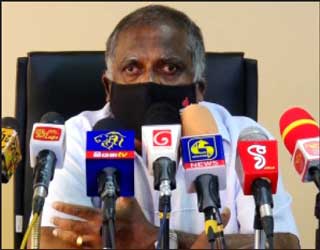Wednesday Feb 18, 2026
Wednesday Feb 18, 2026
Monday, 23 August 2021 00:28 - - {{hitsCtrl.values.hits}}
 |
| JAAF Secretary-General Tuli Cooray
|
The Joint Apparel Associations Forum (JAAF) yesterday affirmed its commitment to support the Government by continuing their manufacturing process amidst the fourth COVID-19 lockdown to put the national economy back on its feet.
“We have been working with the Government throughout to protect our workforce. We are hopeful that within the next couple of weeks, we will be able to administer the balance vaccinations for our workers. In this context, we have decided to continue with our manufacturing processes to meet the requirements of buyers,” JAAF Secretary-General Tuli Cooray told journalists.
Assuring that all health guidelines have been taken to ensure safety, where 53% of the apparel factory workers have received both jabs against COVID-19 and 74% with the first dose; the apex body said that it is ‘impossible’ for them to provide employment to those reluctant to work at this juncture when the Government has declared all export-oriented production as essential services of ‘critical importance’.
The Government imposed a countrywide lockdown last Friday till 30 August, as a COVID-19 containment measure.
“If there is any party saying that they do not want to cope up in this situation, it is impossible for us to continue to work on that basis. It is not only the production that will be impacted within these 10 days of the lockdown, but there is a larger effect in sustaining the business and its impact on the national economy,” he explained.
According to the labour rules, whether the employee reports to work or not, the employer has to pay Rs. 14,500 or 50%of the salary.
The Secretary-General said all export-oriented manufacturing companies have been conducting PCR for 5% of the total employees that has now come down to 1% following the accelerated vaccination program.
“Our priority is to ensure the safety and well-being of our workforce. We ensure that the health guidelines outlined by the Government are adhered to the letter. We have taken extra effort to ensure a safe environment from transport to entry of the factory to working within the premises to canteen and sanitary facilities,” he added.
He also said that to maintain social distancing between workers within factories, they are operating 30% below the capacity.
A total of 11 intermediate care centres (ICCs) have been built with 4,500 beds and more under construction. Depending on the medical expert advice, employees will be directed to ICCs and hospitals, where the cost will be borne by the companies.
“As entrepreneurs, we take risks and engage in the business. We cannot provide limitless protection to everyone working, but we have ensured maximum protection according to health protocols to our entire workforce,” he stressed.
Over one million, or 16%, of the workforce is engaged in the apparel sector, where 350,000 are directly employed in the industry.
“Please don’t disrupt the work,” Cooray humbly pleaded, adding that Sri Lanka only has the European Union GSP+ facility whereas other competitive countries have over 12 preferential trade agreements.
He pointed out that the failure to deliver consignments on time means not only losing the order, but also the markets. “Shifting markets is easier said than done. The majority of our apparel are commodities that other competitive countries like Bangladesh, Vietnam, Cambodia, India, Pakistan and the newest kid in the block Ethiopia are producing. Therefore, it is our duty to save the markets that we cater to and also protect the country’s economy,” he added.
Cooray also said the country is $ 1.25 billion, or 10%, behind the target of $ 5.1 billion for the year, noting that is critical for the sector to buckle up and deliver results in the next couple of months.
The apparel sector contribution to the gross domestic production (GDP) is 16% and its input to the total exports is 43%. In 2019, Sri Lanka recorded $ 5.3 billion, but it dropped sharply to $ 4.1 billion last year as a result of the COVID pandemic.
“Exports are the sole foreign exchange earner for the country at the moment. The earnings are critical for the economy to maintain sufficient foreign reserves, for essential imports such as medicine and vaccines and to service debts. If we discontinue our operations, it will cripple the economy,” he said, highlighting the importance of the export earnings to the country.
When asked if the apparel sector trade unions opposed work in line with the Government’s decision, Cooray denied such allegation. “There may be certain irresponsible people, but our trade unions haven’t. No effort will be sufficient to stabilise the economy if key sectors omit to support collectively,” he stressed.
The JAAF Secretary-General also said that all exporters are facing multiple difficulties with high freight charges, low vessel capacities, non-availability of ships and raw materials.
“The freight charges have gone up by 600% from $ 900 to $ 4,000. Some of the key ports have closed down such as in China. There are difficulties in getting down the raw materials needed for consignments. We all are in this together, but we will not let the country’s economy crash,” Cooray assured.